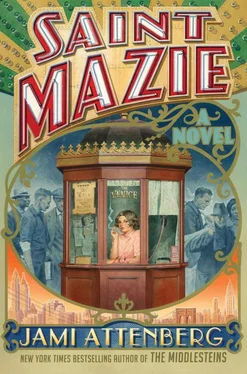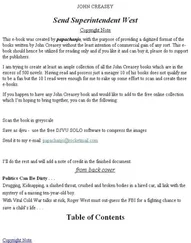She said: I took whatever I could find that was hers. It looked like a bunch of junk. I was looking for our birth certificates, something that could have been about us. I got nothing. I never got anything from her. It’s just trash. Old clothes. It’s rotting. It’s junk. Shoes. I don’t think even half of them match. I don’t know. I grabbed what I could from the bedroom. He followed me in the room. I said I’m taking it, old man. He said no one wanted it anyway just like no one wanted me or any of us or her. I said I will kill you if you don’t keep quiet. I did pull it out of the bag, Louis, I’m sorry. I did wave it at him. I didn’t mean to but the whole way there I was thinking I was glad I had it with me. But I wasn’t going to use it. I wasn’t going to be like him. The moment I saw him though I just wanted to wave it in his face. I wanted to scare him.
I think this is what she said. I’m trying to remember everything she said.
Louis said: It doesn’t matter, you didn’t do anything wrong, sweetheart. I gave it to you for a reason.
She said: I wouldn’t have done it. I just showed it to him. I said, this is ours. I’m waving a gun in his face for a bunch of junk. I’m a fool. I don’t know what I thought I would find.
I went to the trunk and opened it. It smelled horrible.
She said: Maybe I’m the mad one.
Louis told her she wasn’t.
She said: There’s nothing in there worth anything.
Louis shushed her gently.
She said: He pissed himself! Can you believe it? He was laughing at first, because my hand was shaking. Then it was steady and he wasn’t laughing anymore. Nothing was funny anymore, I’ll tell you. Then I heard it, and I looked down. We both did. There was a puddle at his feet.
Louis started laughing.
He said: You’re one tough cookie, Rosie.
Rosie said: Oh my goodness, I’m so tired, husband.
I dug through all the holey, stained clothes, worn shoes, figurines snapped in two. Then I picked up a book. I nearly fainted. It was a diary.
I said: What about this?
Rosie shook her head.
She said: It’s junk, I swear it.
Then she went upstairs to their bedroom. She’s been asleep for a day now.
I’ve been trying to read the diary but it’s impossible. Broken English, shaky handwriting. After all that time with him, she had a blurred brain. I can’t read a damn thing. It’s unfair.
I just wanted to know if she missed us when we were gone.
Mazie’s Diary, February 10, 1920
Too quiet in the car this morning.
I said: Tell me about your family, Louis.
He said: Why you want to know about my family, Mazie?
I said: Because I can’t bear to think of mine anymore. I can’t stand it for another goddamn minute.
He coughed and then he was quiet for a long time.
He said: Well I had a father, and I didn’t know him. He passed when I was young. My mother I remember. She passed when I was thirteen. She had a funny laugh, real deep, as deep as yours. She also had pretty skin. It was especially pale and soft. The thing I remember most, because as I get older things are fading a bit, is that she wrote beautiful letters. Every year for my birthday she’d write me a letter telling me all the things I had done in the last year, and all the things she wished for me the next year. I mean these are great letters, Mazie, for a kid to get. I still have them. It’s a shame they stop so young. I had to make up the rest of my life all on my own.
I said: Where are the letters?
He said: Back at the house.
I said: Can I see them?
He said: Why?
I said: I just want to know how I’m supposed to be.
He said: Sure. You’re doing fine though.
I said: How did your parents die?
He said: They got sick. People got sick a lot more then than they do now. They got sick, and they died, and it was sad, and then it was over. And now I have a new family. Now I have you.
Outside, the sky was white and gray and glittered like some kind of angel.
Then he said: You know maybe I don’t show you the letters right away. It does make me sad to look at them. I like to look at what I have right in front of me, not what’s behind me. I like to look at the good things.
Then he stopped talking. We were quiet all the way till we got to the city.
When I got home tonight I was praying I’d see Rosie in the kitchen but all that was there was that trunk. Together me and Louis moved it out back.
Out of sight, out of mind.
Mazie’s Diary, February 11, 1920
She finally got out of bed today. Back in the kitchen when I left this morning.
Mazie’s Diary, February 14, 1920
Not a love in my life, but a postcard from a captain will do. Postmarked San Francisco, but the picture was of a redwood tree, in a place called Eureka. A child stood next to it, dwarfed by the trunk.
It said: Don’t change one goddamn thing about yourself before I see you again.
I tacked it to the wall. I stood very still for a moment and thought about staying exactly the same forever. That tree would grow, that child would grow, but I would stay just the same in my cage.
Mazie’s Diary, March 15, 1920
The police shut down Finny’s place last night, for good this time I think. Finny’s in jail. I sent bail with one of his bartenders. Mack Walters stopped by, checking the temperature on the street I guess. We got into a tiff about Finny’s arrest.
I said: I’ve seen you drunk there a thousand times.
He said: Finny can’t be running booze like that anymore and he knows it.
I said: I notice you still have that flask of yours bulging in your pocket.
I pointed to his pants.
He said: Oh that? That’s not a flask, Mazie.
He gave me the filthiest look. The lech! I flipped the Closed sign on my cage and turned my back on him. I was laughing though, and he knew it. He’d like to take me out, he’s been asking. I keep telling him I live on Coney Island now, that’s where he’ll find me.
Mazie’s Diary, March 16, 1920
I saw Sister Tee across the street this morning. In flight with her flock. Not a nod, not a wave.
I don’t need her.
Louis stopped by later. A bag in the safe.
I don’t bother asking because he won’t tell me nothing anyway.
Mazie’s Diary, March 19, 1920
I said: Do you worry about Rosie?
Louis said: What about Rosie?
I said: The way she’s always cleaning the kitchen.
Louis said: Do you want to clean the kitchen? Because I sure don’t.
And that’s it for Louis I guess. We’ll have the cleanest kitchen in Brooklyn.
Mazie’s Diary, April 1, 1920
I got on the third train ever from Coney Island to the city this morning. I rode it and I waved good-bye to the ocean.
The train, I’ve been waiting on it forever. The train! Freedom. No more drop-offs or pickups from Louis, no more living on his schedule, on his time. The train! I’ll be out in the world as I please. I can come and go, say hello and good night, whenever I like. My time becomes mine again.
The train!
Elio Ferrante
The completion of the Coney Island subway station was absolutely significant from a historical perspective. As I mentioned it was mostly an upper-middle-class population living on Coney Island, even if they weren’t there full-time. But when they completed construction on the train, there was suddenly easy access to the beach and, thus, an explosion of the working class there on the weekends. So that’s the thing we mainly study, the impact of the train on the class structure in New York City.
But you’re right, it works in the reverse direction, too. Even if it’s not the thing we study, that doesn’t mean it’s not important. If you lived on Coney Island, now you could travel to the city more easily. Trains changed everything. Trains, and also planes and cars, and while we’re at it, the telephone, too. Radios! Color movies! Television! Computers! Medicine and weapons. Pollution. Skateboards. Condoms. Bikinis. Books. Magazines. Elections. Pornography. The lightbulb. I could keep going. Everything changes everything. Everything around us is a piece of history. Every invention, every reaction to it. Every war, every retreat. There is always a trail, Nadine.
Читать дальше












